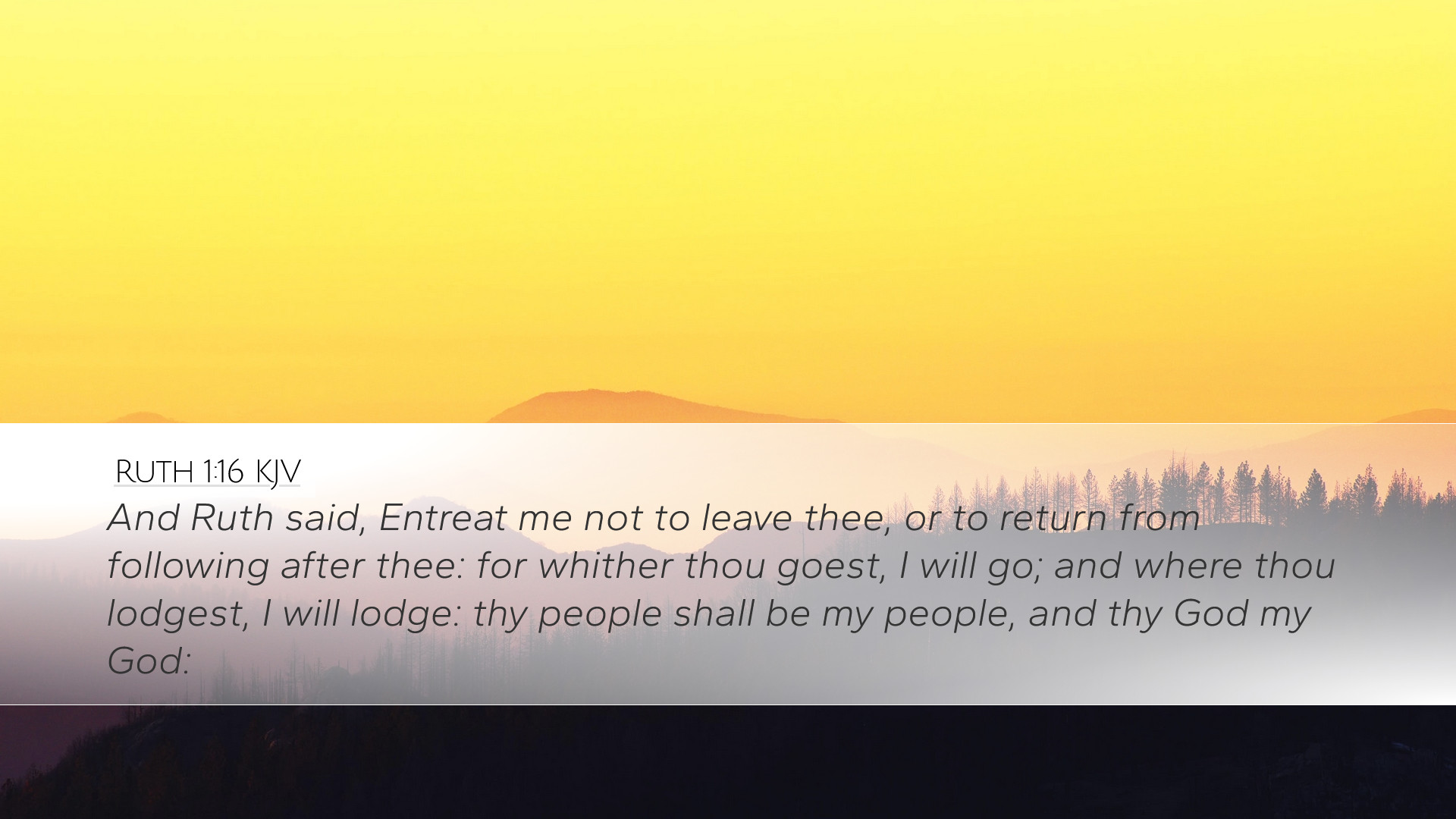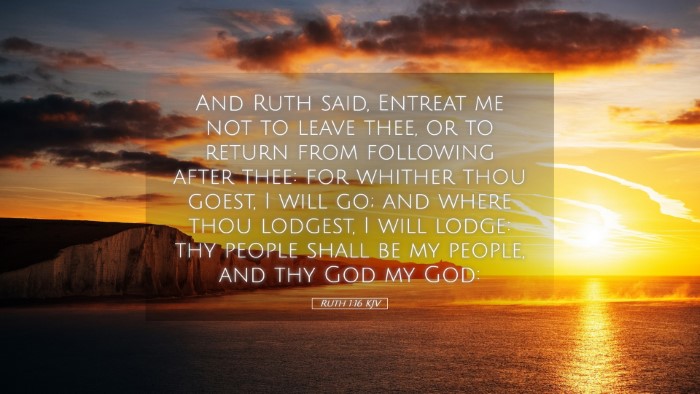Old Testament
Genesis Exodus Leviticus Numbers Deuteronomy Joshua Judges Ruth 1 Samuel 2 Samuel 1 Kings 2 Kings 1 Chronicles 2 Chronicles Ezra Nehemiah Esther Job Psalms Proverbs Ecclesiastes Song of Solomon Isaiah Jeremiah Lamentations Ezekiel Daniel Hosea Joel Amos Obadiah Jonah Micah Nahum Habakkuk Zephaniah Haggai Zechariah MalachiRuth 1:16
Ruth 1:16 KJV
And Ruth said, Entreat me not to leave thee, or to return from following after thee: for whither thou goest, I will go; and where thou lodgest, I will lodge: thy people shall be my people, and thy God my God:
Ruth 1:16 Bible Commentary
Commentary on Ruth 1:16
Ruth 1:16 states:
"And Ruth said, 'Entreat me not to leave you, or to turn back from following after you; for wherever you go, I will go; and wherever you lodge, I will lodge; your people shall be my people, and your God, my God.'
This verse is one of the most poignant declarations of loyalty and commitment found in Scripture. Ruth's words convey not only her devotion to Naomi but also her profound spiritual transformation. This commentary explores the various dimensions of Ruth's statement by integrating insights from esteemed public domain commentaries.
Contextual Background
To grasp the full significance of Ruth's declaration, one must consider the historical and geographical context. The book of Ruth is set during the time of the Judges, a period marked by social upheaval and moral decline in Israel. Naomi, a Hebrew woman, had originally traveled to Moab during a famine. Upon the deaths of her husband and sons, she decided to return to Bethlehem. Ruth, her Moabite daughter-in-law, chose to accompany her despite the cultural rift and potential challenges she would face.
Analysis of Ruth's Commitment
The utterance "Entreat me not to leave you" signifies an intense yearning for connection and partnership. Matthew Henry suggests that Ruth’s commitment highlights the essence of love and loyalty that transcends familial ties, inviting theological reflection upon covenant relationships.
Ruth's Resolve
Ruth’s resolve is also worthy of emphasis. She speaks with a passionate conviction: "wherever you go, I will go." This statement suggests that her allegiance is not merely to Naomi but to the broader life of the community in Bethlehem. Albert Barnes notes that Ruth's choice demonstrates an understanding of the difficulties associated with her decision, reinforcing her admirable courage as a Moabite woman joining the Jewish people.
Spiritual Undertones
The theological implications of this passage are profound. Ruth’s declaration encapsulates the process of conversion; she chooses the God of Israel as her own: "your people shall be my people, and your God, my God." Adam Clarke draws attention to the importance of this moment, illustrating Ruth's complete abandonment of her former life in Moab in exchange for a new identity within Israel. This action showcases a significant shift from the paganism of Moab to the worship of Yahweh, highlighting God's grace and inclusion of Gentiles in His covenant.
Theological Reflections
The small yet mighty book of Ruth offers rich theological lessons, especially concerning God's providence and redemption. As Ruth expresses her intention to follow Naomi, she foreshadows God's redemptive plan that would ultimately unfold through her lineage.
Faith in Action
Ruth's actions reflect a profound faith in God, demonstrating that true faith often requires steps into the unknown. Matthew Henry remarks that faith is active; it articulates desires and intentions that resonate with the believer’s heart. For modern-day believers, Ruth’s commitment serves as a reminder of the radical nature of following God, often leading to cross-cultural and intergenerational relationships.
Ruth as a Model for Christians
Ruth emerges as a model believer for Christians today, siding with those who may be marginalized. Her commitment is not limited to Naomi; it reflects a larger narrative of inclusion where God’s love extends beyond ethnic boundaries. Albert Barnes emphasizes that her example encourages Christians to embrace those outside their cultural groups, showing love and unity through Christ.
Application in Pastoral Ministry
For pastors, Ruth 1:16 serves as an encouraging reminder of the transformative power of love and loyalty. When addressing congregations, it is vital to highlight how commitments to family and community play a central role in the Christian faith. Sharing stories of faithfulness can strengthen the resolve of the church community, helping members to reflect on their own commitment to God, and to one another.
Encouraging Commitment and Loyalty
The theme of loyalty found in Ruth’s declaration can be paralleled with the church's mission. As congregations strive to reflect the love of Christ, encouraging members to cultivate a sense of belonging and commitment is fundamental. Pastors and teachers can draw upon Ruth's commission to foster spiritual family unity within their communities.
Conclusion
Ruth 1:16 serves as an enduring testament to loyalty, love, and faith. By studying this passage, we gain insights not only into Ruth's character but also into the broader narrative of God's redemptive story. Through her declaration, we see a foreshadowing of God's grace that invites individuals from every background into His kingdom. Thus, whether for personal reflection, preaching, or theological study, Ruth's words inspire all who seek to embrace the God of Israel and create a community of faith that reflects love and loyalty.


